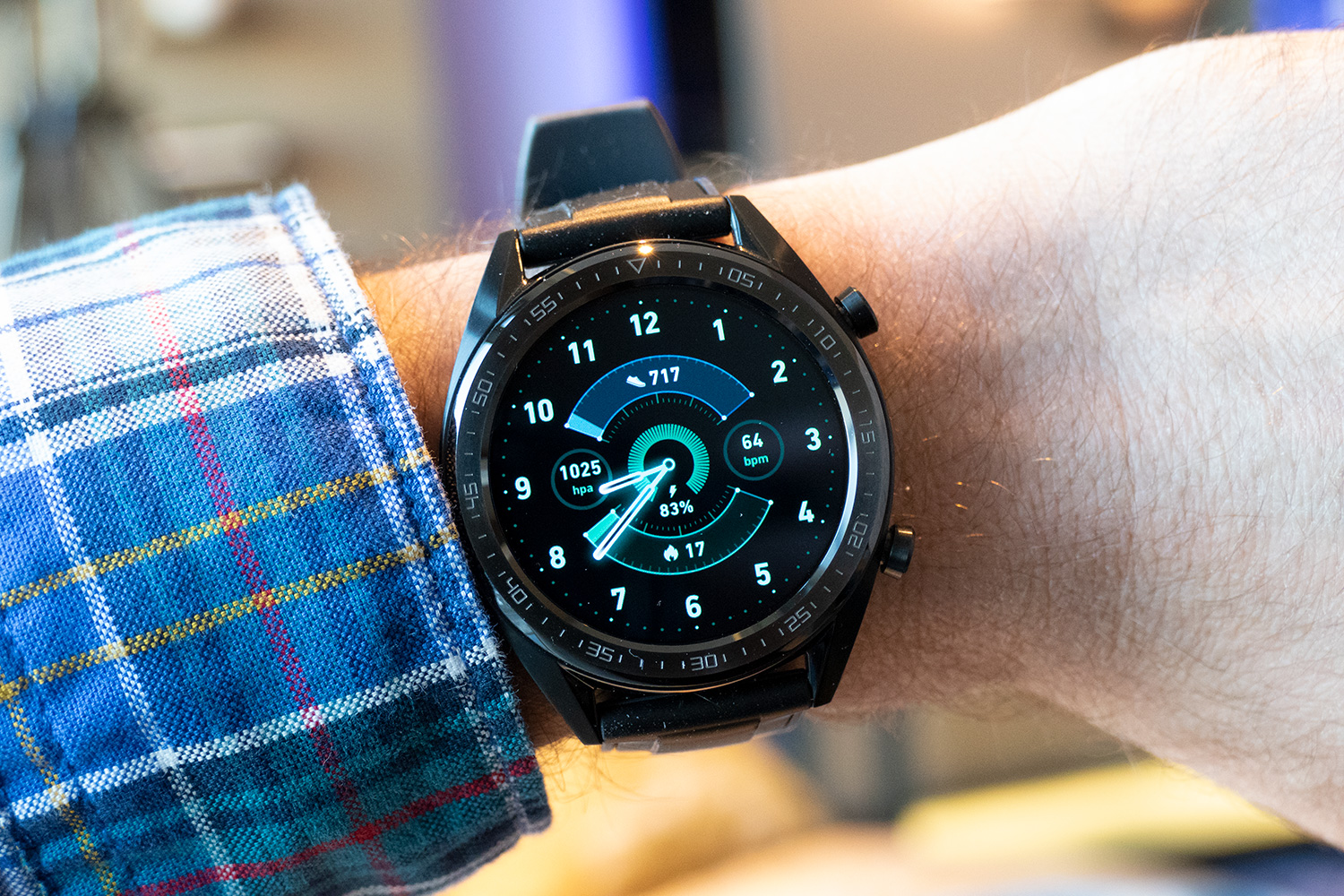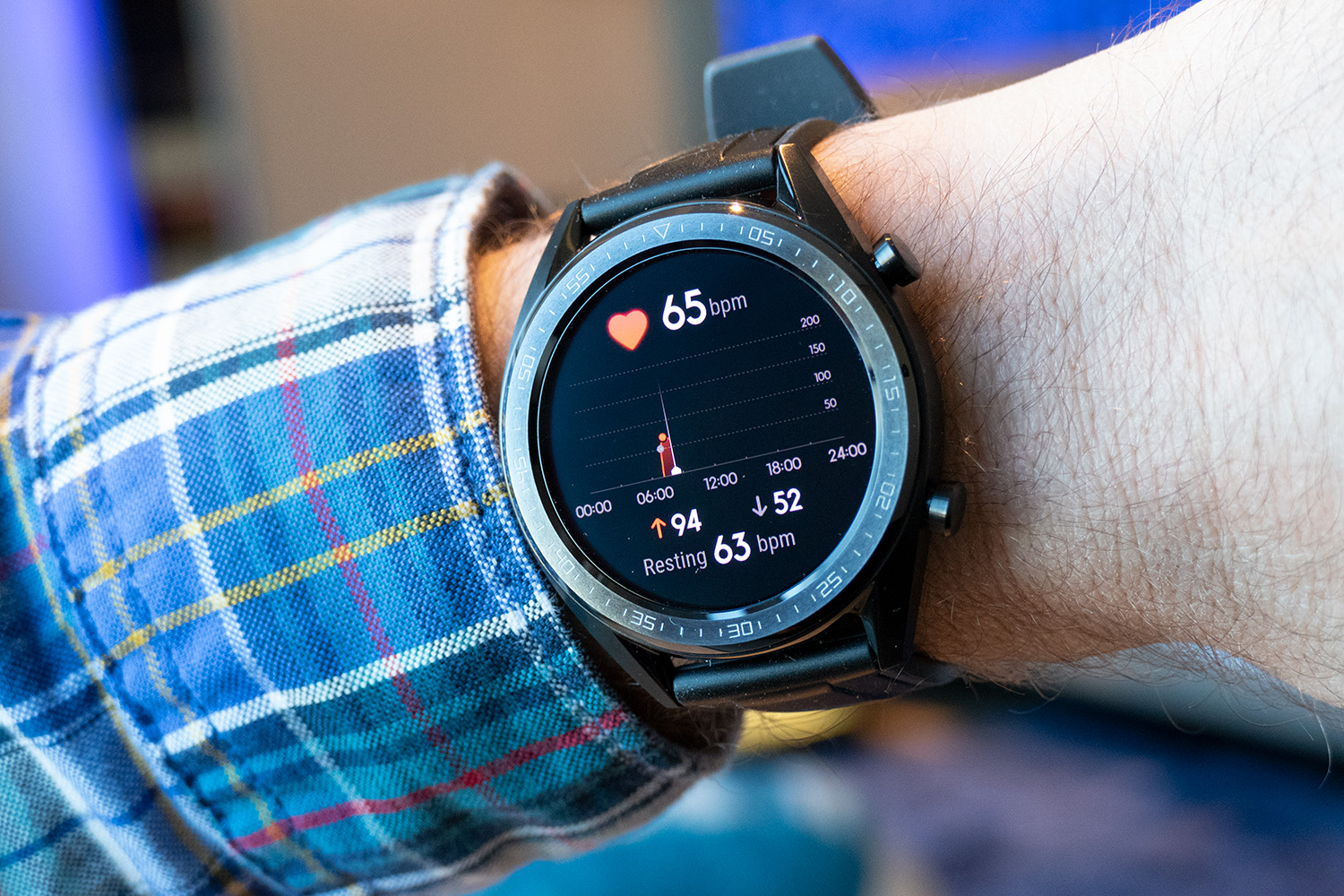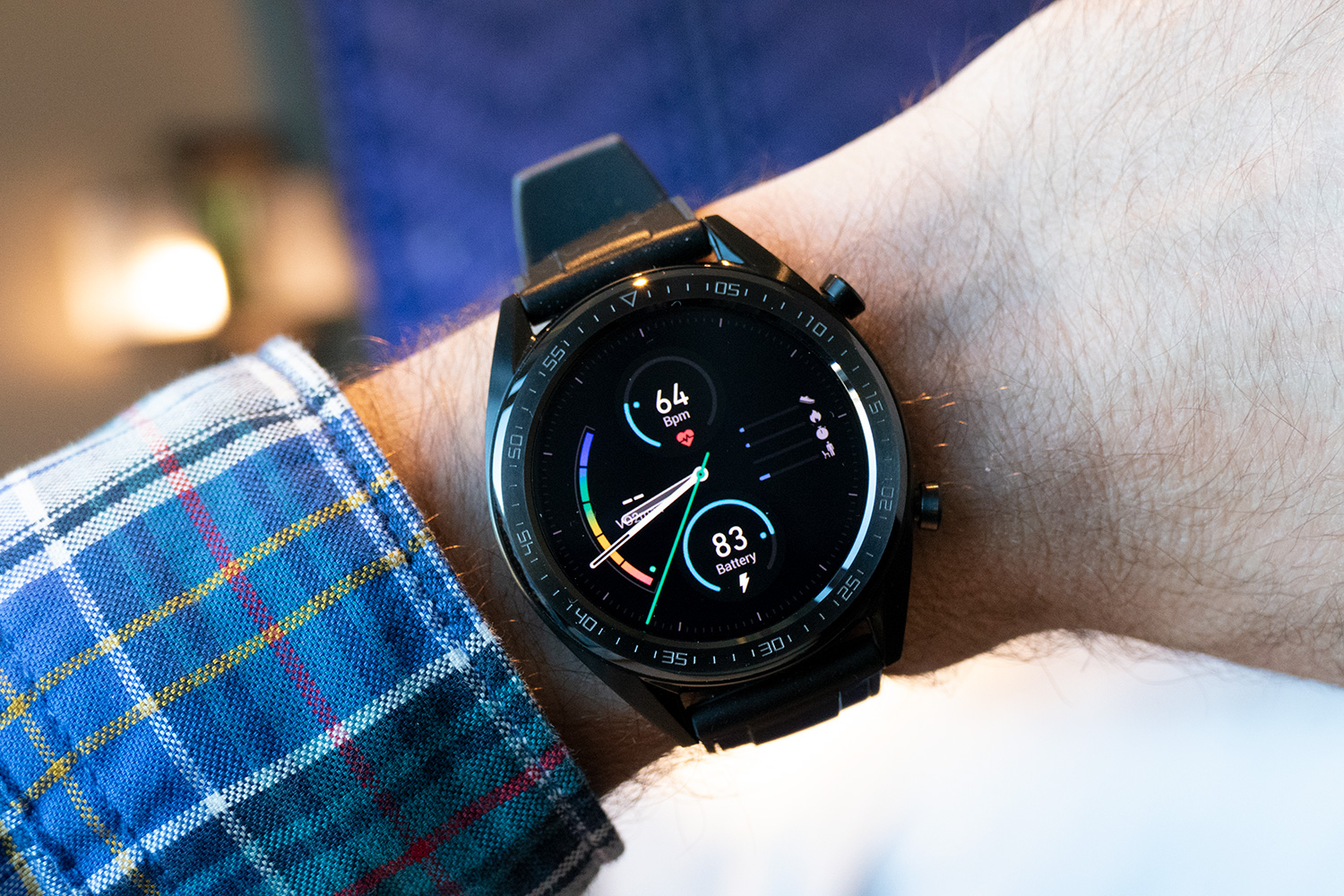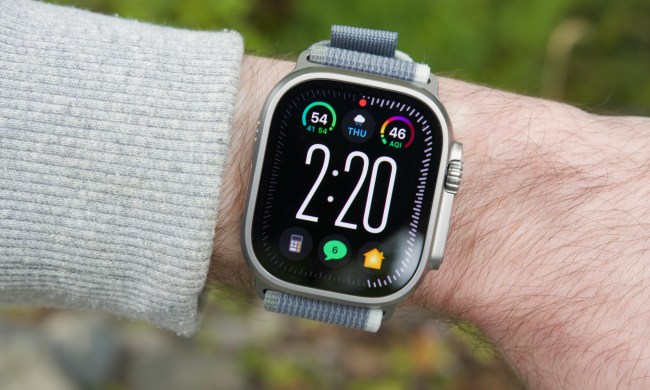“Stylish and long-lasting, the Watch GT nearly has it all, but absent music features leave us baffled.”
- Excellent battery life
- Stylish, wearable design
- Strong fitness tracking features
- Works with Android and iOS
- Not available in the U.S.
- Software needs refinement
- No music streaming or Bluetooth headphone connection
Huawei has spotted what it believes is a gap in the wearables market, and has created the Watch GT to fill it. What is it? It’s not a smartwatch that runs Google’s Wear OS, a hybrid smartwatch, or a fitness tracker. It fits somewhere in-between, and shows what Huawei has been working on while it takes a sabbatical from Wear OS watches.
The Watch GT isn’t a hybrid smartwatch because it has a touchscreen. But it occupies the space between fitness tracker and full smartwatch in a similar way. If all this sounds a little confusing, we agree, and it aptly sums up the watch overall.
Sporty design
Huawei understands how to make a good-looking smartwatch. The original Huawei Watch is a design triumph, and still stands tall among smartwatches released today. The Watch GT isn’t as beautiful, is considerably more masculine, but it’s still very watch-like. If you like sportier watches, then the Watch GT’s look will appeal, much like the Huawei Watch 2. We like it, and find its understated style refreshing. The main case comes in stainless steel or black DLC (diamond-level coating) and is matched to a plastic rear plate, which feels cheap and at odds with the ceramic bezel around the screen.
It’s slim at only 10.6mm thick, so it feels like a traditional watch on the wrist, where it is very comfortable. The light 46 gram weight means it’s easy to forget you’re wearing it, and we also managed to sleep through the night with it on. Loosening the strap first, it didn’t get sweaty and uncomfortable.
The 1.4-inch, 454 x 454 resolution AMOLED screen isn’t surrounded by a large bezel. Paired with a slim body, the entire watch looks surprisingly compact. It fit our average-sized wrist without a problem, but we don’t think the masculine design will appeal to everyone.
Huawei understands how to make a good-looking smartwatch.
The strap with our review model is made of pliant silicone, and is wonderfully wearable. It never got sweaty or itchy underneath, or annoyingly caught hair. It did tend to get stuck on clothing though. An alternative leather version with a silicone underside is also available, matched to a stainless steel body. This strap will be great for everyday wear, and the silicone underside resists sweat nicely. There are quick-release bars to make changing the strap simple.
There are two buttons on the side of the body, rather than a single crown, which is an unusual style choice. It looks fine, but does take a little getting used to. A bonus is they don’t have a tendency to dig into the top of your wrist. There is no finesse to the buttons, they feel like any other basic button when pressed, and this is representative of the Watch GT overall: Functional and simple, but not overly premium.
The Watch GT is comfortable, relatively stylish, and a good size. It’s just not very special. We wore it each day, but never looked forward to putting it on, or that keen to show it off by pushing our sleeve up. We definitely prefer it to wearing a fitness band, which no-one wants to show-off, but there are a great many better looking hybrid smartwatches out there that are considerably more luxurious and desirable.
Lite OS
The Watch GT does not use Google’s Wear OS, and instead uses Huawei’s own operating system called Lite OS, which looks a bit like Wear OS and Samsung’s Tizen, but not quite as pretty, and it’s unable to run apps. We used the Watch GT primarily connected to an iPhone XS Max, but also tested it with the Honor Magic 2. The experience was mostly identical.
It operates in the same way as Wear OS — you swipe the screen a lot. Swipe up for notifications, swipe down for a quick access panel, swipe right or left to see data panels with information on the weather, heart rate, and fitness. It has a raise-to-view feature which works well following an update, but annoyingly a tap of the screen does not wake it up, and you’re forced to press a button instead. It’s not very intuitive. The buttons are not configurable. The top button opens the menu, while the lower button offers quick access to the fitness center. This saves you about two steps instead of using the top button, and is a bit of a waste.
There are 12 watch faces to choose from, but none are very inspiring, with at least half being unattractively filled with data and numbers. Those that look like watch faces look very digital, like they’re from Wear OS circa two years ago. The high resolution screen makes them look good though. Complications are all fixed, and can show step count, battery percentage, heart rate, and even weather information. It delivers notifications from your phone, but not very effectively. They appear in a long scrolling list accessed by swiping up from the bottom of the screen, but you cannot respond to any. The format is not consistent either. Instagram notifications say they’re from Instagram, yet Twitter notifications don’t say the source, and at times some will just say “Message,” before the content. Yes, you get the details, but it’s not very polished or helpful.
When we tested a pre-release model the software on the Watch GT was disappointing, but updates have improved its responsiveness and visual smoothness. However it’s still not perfect, and is slower than we’d like, lacks customization, and doesn’t have third-party app support. We also had a situation where the battery was entirely drained overnight, presumably due to an app or process problem. Huawei hasn’t given up on Wear OS, but so far Lite OS is not a compelling alternative like Samsung’s Tizen or Apple’s WatchOS.
Fitness tracking
Despite the conventional watch-type looks, the Watch GT is made for fitness tracking. It has onboard GPS, a heart rate sensor, swim-proof water resistance, and connects to Huawei’s own Health app, which is available for both Android and iOS. The experience is comprehensive without being overwhelming, and for the casual fitness fan it’s more than enough. There may not be enough depth for the serious athlete.
If music is in the background to all your workouts, then the Watch GT won’t be for you.
There are tracking modes for running, cycling, swimming, climbing, and an “Other” section for general workouts. Activate these and the watch takes your heart rate, counts calories, and time elapsed. All this data is synced to the Huawei Health app on your phone. We tracked several workouts using both the Watch GT and the Apple Watch Series 4 and found the heart rate measurements were mostly consistent, and also matched that of the stationary bike at the gym, as did the calorie burn.
We like the recovery timer to make sure you’re getting the right amount of rest, plus a training load measure to indicate how hard you’re working. Runners also get a VO2 Max readout to show workout intensity. This mode is only accessed when using GPS outdoors, so not everyone will find this of use. The information is clearly displayed on the screen when tracking a workout, and provided you find data and meeting a basic set target — step count, for example — motivating, then you’ll be pleased with the Watch GT. However, if you want more in-depth data you have to look at the Huawei Health app, which presents long-term data on-screen.
The app’s further features are also geared towards runners, with the chance to create run-based training plans. The Huawei Health app and Watch GT will track sleep too, complete with heart rate data, and a very comprehensive breakdown of sleep phases. The Watch GT genuinely has all the fitness bases covered, and delivers the right data in a clear way too.
However the problem with the main fitness tracking remains — it doesn’t provide much in the way of motivational feedback, or goals to meet. Apple does this superbly by pushing you to, “close the rings,” but outside of a reminder to stand up every now and then, and a suspect ring-based watch face, the Watch GT leaves you to get yourself motivated.
We’re satisfied with the Watch GT’s fitness tracking ability, but there is a massive feature oversight that is confusing, and makes us wonder who the watch is for: It doesn’t have any internal storage, and cannot stream music to Bluetooth headphones. Considering it has standalone GPS, so is therefore designed to be used without your phone, and the fitness features are aimed at runners, this is a bizarre decision. It doesn’t even have on-screen controls for music playing on your phone. If music is in the background to all your workouts, then the Watch GT won’t be for you.
Battery and other features
If the Watch GT has been a mixed bag so far, now we’re getting to the best part. The Huawei Watch GT has superb battery life, and it’s the reason Huawei ditched Wear OS and developed its own software. Mission most definitely accomplished.
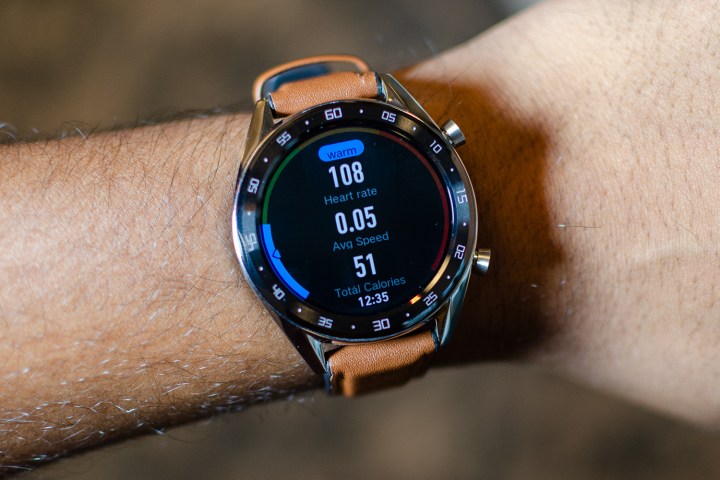
The battery is designed to last two weeks with the heart rate monitor active for about 90 minutes each week. For the more hardcore, the Watch GT’s battery will give 22 hours use with the screen active, GPS running, the heart rate monitor flashing, and a fitness program going too. Turn everything off apart from the screen and incoming alerts, and it’ll go for 30 days.
The Huawei Watch GT has superb battery life.
We’d say the two-week estimate is if anything, slightly conservative. In our time, the battery would reduce by five or six-percent daily with a workout, and even after 14 days it still had around 15-percent left. Obviously this will vary with your use, but the estimates are real, and more battery life in a smartwatch is very desirable. The charging plate uses magnets and two pins to clamp on the back of the watch, and is happily much more secure than the one for the Huawei Watch 2, but it’s still a boring piece of circular plastic, and a full recharge can take a couple of hours.
The Watch GT does not have Wi-Fi, or NFC for any kind of mobile payment system, or the ability to integrate passes for use with public transport.
Price, availability, and warranty
The Huawei Watch GT is not available to buy in the U.S., but can be purchased in the U.K.. The black version with the silicone strap seen here costs 180 British pounds, or about $230, while the stainless steel model with one of the leather straps costs 210 pounds, or about $265. It’s available through various retail outlets including John Lewis, Argos, and Amazon. Huawei provides a two-year warranty against defects and faults, with six months on the battery. It’s a return and repair system, and doesn’t cover wear-and-tear, or abused products.
Our Take
Huawei so nearly gets the Watch GT exactly right. The battery life is right in the sweet spot, the design is solid, and the fitness tracking will appeal to most casual gym-goers. But we’re disappointed there’s no music features at all, and the software still needs refinement to make it a true smartwatch competitor.
Is there a better alternative?
There are many better alternatives, but it depends on how much you want to spend as to which one we’d recommend you buy. If you’re in the U.S., the Watch GT’s strongest challenger at the price is the Mobvoi TicWatch C2. At $200 it has the same type of design, GPS, and a heart rate sensor, plus all the benefits of Wear OS. It is missing the desirable long battery life though. In fact, the Huawei Watch GT stands almost alone in mixing a watch-like design with simple touchscreen smartwatch features, and genuinely great battery life.
Happy to spend more? The Apple Watch Series 4 is the best smartwatch available, but it’ll cost you twice as much. However, it does twice as much as the Watch GT, including just as good fitness tracking, standalone GPS, and music playback. If you use an Android phone, the $330 Samsung Galaxy Watch is our pick. It has a similar design to the Watch GT, and many of the benefits of the Apple Watch.
Other smartwatches to investigate include the $250 Mistfit Vapor 2, which costs around the same as the Watch GT, but suffers — like so many of its alternatives — from poor battery life. If long battery life is a must-have, then how about a hybrid watch like the $180 Nokia Steel HR, or even a basic fitness tracking watch like the $120 Casio G Shock GBA-800? More serious athletes may want to examine the $500 Polar Vantage V, or the $300 Coros Pace. If the fitness aspect appeals most, then any decent fitness band will deliver the tracking goods for a lower cost, but with extra ugliness.
How long will it last?
The Huawei Watch GT has swim-proof water resistance, but it’s not a super-tough rugged watch, so you may still want to be careful with it in some situations. It has not sustained any visual damage from day-to-day use in our time with it though. Lite OS could potentially improve with software updates, and some have come through since we began our review, but long-term status of updates is unknown. The same applies to the Huawei Health app for your phone.
It’s the battery inside that will affect ownership of the watch, as it has a finite lifetime. While standby time may deteriorate, it won’t happen for years, and we’d imagine you’ll get bored of the watch itself before it’s past its best.
Should you buy it?
Yes, but keep your expectations in check. This is not an Apple Watch replacement, nor is it a simple fitness tracking wearable. It’s somewhere in-between, catering more to someone who wants style over substance. Provided music does not play a part in your workout regime, the long battery life and strong design makes the Watch GT a good purchase.





